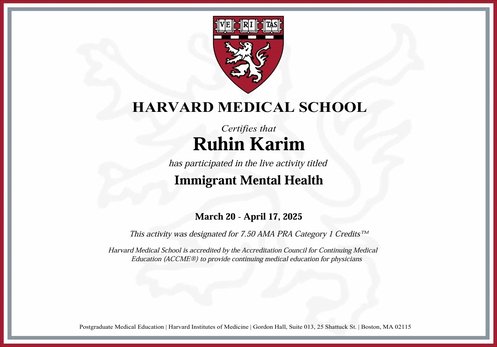Expert Witness Reports
Immigration Medical Reports & Expert Witness Services
All medical assessments are carried out by Dr Ruhin Karim, a highly experienced GP and expert witness with a strong background in immigration and medico-legal reporting.
At Regency Medical, we are proud to be accredited by the UK Register of Expert Witnesses.
This recognition allows us to provide court-ready, detailed medical reports that assist judges in making informed, fair decisions in immigration and asylum cases. Our expert reports simplify complex medical and psychological conditions for legal professionals, ensuring every relevant factor is fully considered.
Vetted Member of the UK Register of Expert Witnesses
Immigrant Mental Health Training from Harvard Medical School, USA


All assessments are conducted in-person by Dr Ruhin Karim after receipt of a letter of instructions and medical records from the legal team. Clients should not contact us directly.
Consultation location:
Regency Medical Clinic
1B Clive Road, Portsmouth, PO1 5JB
To ensure the integrity and independence of our clinical process, we kindly request that clients contact the clinic only for booking appointments with our administrative team. Please refrain from reaching out to clinical staff directly for any other matters, as this helps us maintain our role as an independent witness in your care. Thank you for your understanding and cooperation.
REMOTE VIDEO CONSULTATIONS can be considered for those deemed to be suitable after review of letter of instructions and supplied records. It is usually suitable for those that DO NOT require a physical exam. Please discuss prior.
Visiting Service (on request – Please contact us directly for terms and availability for off-site visits.)
- Patient’s home
- Solicitor’s office
- UK detention centres
Why Choose Regency Medical?

Multilingual and Cultural
Dr. Karim is fluent in English, Bengali, Sylheti, Urdu, and Hindi
Enabling clear & empathetic communication
Assess clients from diverse backgrounds
Respect and reflect the client’s unique background
Respect cultural & religious beliefs
Respect cultural health needs

Holistic Assessment
Holistic Medical Approach
Offering comprehensive assessments addressing:
Medical and surgical conditions
Psychological disorders (e.g., PTSD, anxiety, depression, phobias)
Mental health vulnerabilities
Disability and cognitive impairments

Areas of Specialisation
Medical evidence for:
The impact of removal or deportation
Family health and vulnerability assessments
Asylum and deportation hearings
Disability, memory loss, and mental illness
KoLL (Knowledge of Language and Life in the UK) exemption assessments, including medical justification
Case Examples
Examples of Cases Covered
Mental Health & Psychological Impact
Individual with known mental health conditions and suicidal ideation – assessing risk if deported.
Detainee developing suicidal thoughts in custody – evaluating the impact of detention and loss of UK mental health support.
Patient from Bangladesh with memory loss and inconsistent history – assessing psychological stress and memory-related disorders.
Child affected by parent’s deportation – analysis of short- and long-term emotional and developmental impacts.
Kurdish asylum seeker – mental health evaluation and fear of return to a war-torn region.
Patient from Kolkata with undiagnosed sexual abuse and PTSD – in-depth trauma and psychological assessment.
Chronic Illness & Medical Concerns
HIV-positive individual – assessing implications of removal to a country with inadequate healthcare.
Rheumatoid arthritis patient – evaluating treatment continuity and long-term disability impact.
Nigerian patient with neurological and mobility issues – assessing medical needs, fitness to fly, and safety of deportation.
Russian national with multiple chronic illnesses – evaluating physical and psychological effects of return to a conflict-affected country.
Age-Related & Dependency Factors
Elderly patient with dementia (from Bangladesh) – assessing suitability of return and continuity of care.
Primary caregiver at risk of deportation – analysing consequences for the dependent partner’s wellbeing and health access.
Cultural & Social Vulnerability
LGBTQ+ individual from Pakistan – assessing psychological impact and risk due to persecution in home country.
Kurdish asylum seeker – repeated case focus on psychological trauma and safety in conflict zones.
Behavioural & Situational Assessments
Passenger arrested for aggression and alcohol use during flight – assessing underlying factors such as claustrophobia, anxiety, and alcohol misuse during air travel.
Report Process
What You Receive: Step-by-Step Process
1. Discussion with Instructing Solicitor (if required)
A 15-minute pre-instruction discussion with legal team to clarify legal instructions, key case questions, and the scope of assessment.
2. Pre-Assessment Research
Review of past medical records and immigration history
Country-specific medical and mental health research relevant to the client’s situation
3. Comprehensive Face-to-Face Assessment
A 2-hour assessment exploring:
Physical and mental health
Medical history and current treatments
Cultural, social, and environmental risks
4. Detailed Medico-Legal Report
Tailored, legally compliant expert opinion
Structured answers to solicitor’s questions
Professional, evidence-based conclusions
10–12 hours of preparation time typically invested per report for simple cases (complex cases will incur extra hours)
5. Report Delivery
Delivered by email within 7 working days, assuming full instructions and medical records are received
Fast-track service available on request
6. Amendments to Report
Amendments requested within 5 working days of delivery are included at no extra cost
Later amendments subject to £300/hour charge (with prior agreement)
Fees and Payment Terms
At Regency Medical, we offer transparent, discounted fixed pricing for our pre-paid immigration medico-legal reports, with options for both routine and urgent services. These fees have been reduced and only apply for pre-payment and non-complex cases. Upon review of letter of instructions and records, these fees may increase depending on complexity. Please see our Terms and Conditions.
For legal aid cases please contact us for bespoke terms and conditions.
Standard (Routine) Service
Appointments booked 2 weeks or more in advance
Report delivered within 7-days after assessment
Invoice due 14 days or more before the scheduled assessment date
From £1200
Urgent Service
Appointments booked less than 2 weeks
Report delivered within 7-days after assessment
Full payment due on the day of booking
From £1800
Additional Work
For extra work outside the agreed scope
Includes extended solicitor queries, re-assessment, late amendments, or detailed rebuttals
Payment due prior to booking any extra additional work
From £1800
Frequently asked questions
What is an immigration medical expert witness report?
An immigration medical expert witness report is an independent, objective assessment prepared by a qualified healthcare professional. It provides expert evidence on an individual’s physical or mental health relevant to immigration or asylum proceedings, such as corroborating claims of trauma, assessing risk on return, or commenting on treatment needs.
What should be included in the instructions to the expert?
Instructions should be clear, specific to the individual, and detail the type of report required. They must include all relevant documents (e.g., medical records, witness statements, tribunal determinations) and highlight any inconsistencies or credibility issues in the case.
What does the report typically cover?
A standard report may include:
- Background and history of trauma
Physical injuries (if relevant)
- Mental health overview
- Clinical plausibility of reported symptoms
- Treatment, recommendations, and prognosis
- Ability to give evidence or be interviewed>
- Risk in detention or on return to country of origin
- Suicide risk or vulnerability (if relevant)
What standards should reports meet?
Reports should be prepared in accordance with recognised standards, such as the Istanbul Protocol for documenting torture. They must be printed on official letterhead, signed, and dated, and include the expert’s contact details and credentials.
Can a medical expert witness certify someone as 'fit' to give evidence?
No, a medical expert cannot certify that a witness is ‘fit’ to give evidence in immigration or asylum appeals. Their role is to provide an assessment of health and its impact, not to make legal determinations about fitness to testify.
Who can write an immigration medical expert witness report?
Reports may be written by doctors, psychologists, or other regulated healthcare professionals with relevant expertise and experience. The clinician must outline their credentials, training, and experience in the report to establish their authority as an expert witness.
Who can write an immigration medical expert witness report?
Reports may be written by doctors, psychologists, or other regulated healthcare professionals with relevant expertise and experience. The clinician must outline their credentials, training, and experience in the report to establish their authority as an expert witness.
How is the independence of the expert maintained?
The expert’s role is to provide objective evidence for the court or tribunal, not to advocate for either party. Reports must be unbiased, and experts should disclose if their opinion differs from other medical records, such as GP notes.
How is medical evidence used in immigration cases?
Medical evidence is considered alongside other evidence to inform decisions about protection needs, credibility, and risk. The court or Home Office must give appropriate weight to expert evidence, especially when it helps explain inconsistencies or provides information the claimant could not convey in interviews.
How do I instruct an expert for a report?
Provide the expert with comprehensive, relevant documentation and clear instructions tailored to the individual’s circumstances. Avoid generic or copied instructions; each case should be treated uniquely.
What types of cases benefit from medical expert evidence?
Medical expert evidence can be crucial in cases involving physical or psychological trauma, mental health conditions, risk of harm on return, or where an applicant’s ability to participate in proceedings is in question.
